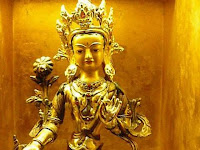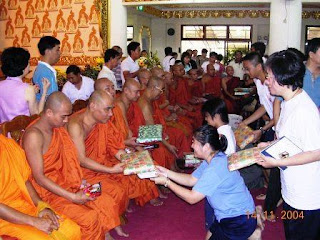Learning Concentration
In our practices, we think that noises, cars, voices, sights are distraction that come and bother us when we want to be quiet. But who is bothering whom? Actually, we are the ones who go and bother them. The car, the sound are just following its own nature. We bother things through some false idea that they are outside us and cling to the ideal of remaining quiet or undisturbed.
Learn to see that it is not thing that are bothering us, that it is we are the ones who go out to bother them. See the world as a mirror. It is all a reflection of mind. When you know this, you can grow in every moment and every experience reveals the truth and brings understanding.
Normally, the untrained mind is full of worries and anxieties, so when a bit of tranquillity arises from practising meditation, you easily become attached to it, mistaking states of tranquillity for the end of meditation. Sometimes you may even think you have put an end to lust and greed or hatred, only to be overwhelmed by them later on. Actually it is worse to be caught in calmness than to be stuck in agitation because at least you will want to escape from agitation, whereas you are content to remain in calmness and not go any further.
When extraordinarily blissful, clear states arise from insight meditation practice, do not cling to them. Although the tranquillity has a sweet taste, it too must be seen as impermanent, unsatisfactory and empty. Absorption is not what the Buddha found essential in meditation. Practice without thought of attaining absorption or any special state. Just know whether the mind is calm or not and if so, whether a little or a lot. In this way, it will develop on its own.
Nevertheless, concentration must be firmly establishes for wisdom to arise. To concentrate the mind is like turning on the switch and wisdom is the resulting light. Without the switch, there is no light, but we should not waste our time playing with the switch. Likewise, concentration is the empty bowl and wisdom the food that fills it and makes the meal.
Do not be attached to the object of meditation such as a mantra, know its purpose. If you succeed in concentrating your mind using the mantra "Buddho", let the mantra go. It is a mistake to think that to stop repeating "Buddho" would be laziness. "Buddho" means "the one who knows", if you become one who knows, why repeat the word?
Learn to see that it is not thing that are bothering us, that it is we are the ones who go out to bother them. See the world as a mirror. It is all a reflection of mind. When you know this, you can grow in every moment and every experience reveals the truth and brings understanding.
Normally, the untrained mind is full of worries and anxieties, so when a bit of tranquillity arises from practising meditation, you easily become attached to it, mistaking states of tranquillity for the end of meditation. Sometimes you may even think you have put an end to lust and greed or hatred, only to be overwhelmed by them later on. Actually it is worse to be caught in calmness than to be stuck in agitation because at least you will want to escape from agitation, whereas you are content to remain in calmness and not go any further.
When extraordinarily blissful, clear states arise from insight meditation practice, do not cling to them. Although the tranquillity has a sweet taste, it too must be seen as impermanent, unsatisfactory and empty. Absorption is not what the Buddha found essential in meditation. Practice without thought of attaining absorption or any special state. Just know whether the mind is calm or not and if so, whether a little or a lot. In this way, it will develop on its own.
Nevertheless, concentration must be firmly establishes for wisdom to arise. To concentrate the mind is like turning on the switch and wisdom is the resulting light. Without the switch, there is no light, but we should not waste our time playing with the switch. Likewise, concentration is the empty bowl and wisdom the food that fills it and makes the meal.
Do not be attached to the object of meditation such as a mantra, know its purpose. If you succeed in concentrating your mind using the mantra "Buddho", let the mantra go. It is a mistake to think that to stop repeating "Buddho" would be laziness. "Buddho" means "the one who knows", if you become one who knows, why repeat the word?




Comments